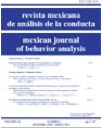IN THE ANALYSIS OF BEHAVIOR, WHAT DOES “DEVELOP” MEAN?
Main Article Content
Abstract
The basic fact generating developmental psychnlngies is that across the Iífe span, much behavior change seems orderlv and predictable. tf that s true, it allows the inference that this change is systematic. The question then becornes, what is the system? Most developmental psychologies posit a teleolngical endngenous system, ín the form of a global goal or outcome tnward which this behavior change is supposedly directed. The value of these constructs is that they explain the changes, nnt that they might be true. Eehavinr analysis is at least a cnmpilatinn of very effective behaviorchange mechanisms, alrnost entirely in the form of environmental contingencies, most of which are experimentally rnanageable. That class of facts allows the emergence of a null hypothesis, o the fnrm nf a question: How rnany of the orderly, predictable behavior changes labelled ‘developmental’ are factually explainable as orderly, predictable applicatinns nf the well-known behavior-analytic mechanisms at those points o the life span? lo the extent that this question is answered Yes, te that extent the problem nf explainíng “development becomes a problem in sociology: Why does society arrange those mechanisrns that are predictable at thnse times?
